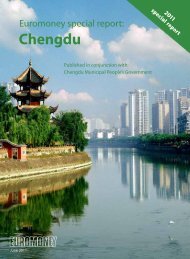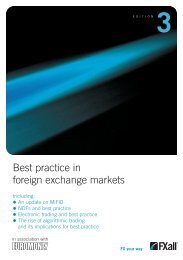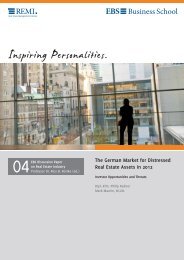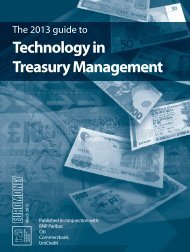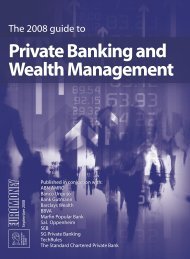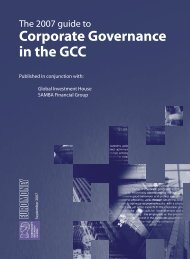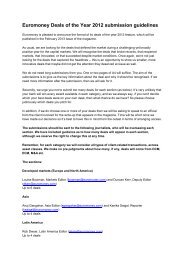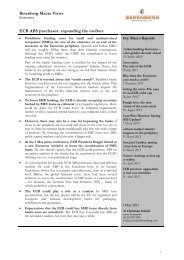A compell<strong>in</strong>g opportunityfor asset managersOil prices at $100 a barrel and more are not <strong>the</strong> only th<strong>in</strong>g generat<strong>in</strong>g excitement about <strong>the</strong>prospects for <strong>the</strong> <strong>GCC</strong> economies. Non-oil GDP is also <strong>in</strong>creas<strong>in</strong>g and <strong>the</strong>re’s a young populationwith <strong>in</strong>creas<strong>in</strong>gly sophisticated <strong>in</strong>vestment requirements. Chris Wright reportsThe Gulf represents one of <strong>the</strong> most excit<strong>in</strong>g opportunities for asset<strong>management</strong> anywhere <strong>in</strong> <strong>the</strong> world. At a time when global markets arebe<strong>in</strong>g rocked by credit problems and an uncerta<strong>in</strong> economic outlook,<strong>the</strong> Gulf Cooperation Council (<strong>GCC</strong>) presents a compell<strong>in</strong>g range ofdrivers: grow<strong>in</strong>g wealth, at a sovereign and <strong>in</strong>dividual level, fuelled by arecord oil price; grow<strong>in</strong>g sophistication <strong>in</strong> <strong>in</strong>vestment; liberaliz<strong>in</strong>g regulatoryenvironments across <strong>the</strong> region; and stock markets that show littlecorrelation to global equities.At <strong>the</strong> heart of <strong>the</strong> Gulf’s appeal is its streng<strong>the</strong>n<strong>in</strong>g economic position,and it sets a framework for <strong>the</strong> growth of a vibrant asset <strong>management</strong><strong>in</strong>dustry. National <strong>in</strong>come growth averaged 19% <strong>in</strong> <strong>the</strong> six <strong>GCC</strong> nations(Saudi Arabia, Kuwait, Qatar, <strong>the</strong> United Arab Emirates, Bahra<strong>in</strong> andOman) <strong>in</strong> <strong>the</strong> four years to June 2007; over <strong>the</strong> same period, <strong>GCC</strong> governmentsadded $500 billion to <strong>the</strong>ir net foreign assets despite huge spend<strong>in</strong>gon projects. In <strong>the</strong> Middle East generally, GDP doubled between 2002and 2007, and is projected by Morgan Stanley to reach $1.045 trillion <strong>in</strong>2008, represent<strong>in</strong>g a compound annual growth rate of 16%; and with<strong>in</strong>that, <strong>the</strong> <strong>GCC</strong> is not only by far <strong>the</strong> biggest chunk (Saudi Arabia is 37%of regional GDP) but is grow<strong>in</strong>g <strong>in</strong> <strong>in</strong>fluence – Qatar, Kuwait and <strong>the</strong> UAEraised <strong>the</strong>ir share of regional GDP collectively from 27.5% <strong>in</strong> 2002 to35.4% <strong>in</strong> 2007, accord<strong>in</strong>g to Morgan Stanley.Additionally, <strong>the</strong> Gulf is one of those rare parts of <strong>the</strong> world where <strong>the</strong>age dependency ratio is decl<strong>in</strong><strong>in</strong>g: it’s a young region, with its populationenter<strong>in</strong>g a demographic sweet spot, and more and more people ofa work<strong>in</strong>g age.In large part, it’s all about oil. The Middle East provides 62% of global oilreserves and 31% of global production, accord<strong>in</strong>g to Deutsche Bank;<strong>the</strong> <strong>GCC</strong> alone was already generat<strong>in</strong>g a current account surplus of over30% of GDP <strong>in</strong> 2007, and that’s before oil topped US$100 per barrel.Accord<strong>in</strong>g to <strong>the</strong> National Bank of Kuwait, <strong>GCC</strong> hydrocarbon exportrevenues climbed 47% <strong>in</strong> 2005 and ano<strong>the</strong>r 20% <strong>in</strong> 2006, reach<strong>in</strong>g $360billion <strong>in</strong> <strong>the</strong> last of those years, and that, aga<strong>in</strong>, is based on a far lower oilprice than today. A cross section of analysts and <strong>the</strong> IIF suggests that <strong>the</strong>break-even prices for oil produc<strong>in</strong>g countries are between $25 and $42per barrel <strong>in</strong> <strong>the</strong> various <strong>GCC</strong> countries – and ‘break-even’ simply means<strong>the</strong> revenue required to balance <strong>the</strong> budget. Analysts say that governmentspend<strong>in</strong>g is generally based on <strong>the</strong> assumption of $50 a barrel.“At $51, you’re putt<strong>in</strong>g ano<strong>the</strong>r dollar <strong>in</strong>to <strong>the</strong> sovereign wealth fund forevery barrel of oil,” says Daniel Smaller, manag<strong>in</strong>g director for sales anddistribution at Algebra Capita, an <strong>in</strong>dependent fund manager <strong>in</strong> Dubai.“So at $110...”Accord<strong>in</strong>g to data from <strong>the</strong> IMF and HSBC, every $1 <strong>in</strong>crease <strong>in</strong> <strong>the</strong> oilprice, susta<strong>in</strong>ed for one month, means an additional $500 million ofrevenues for <strong>GCC</strong> producers. If one considers <strong>the</strong> difference between oilat $60 a barrel, and at $80 per barrel, it equates to a <strong>GCC</strong> economy $200billion bigger, or 25%; a fiscal surplus $100 billion bigger, or 90%; and acurrent account surplus $100 billion bigger, or 70%. “If oil dropped to$50, <strong>the</strong> economy would cont<strong>in</strong>ue to grow at a very healthy rate,” saysTarek Sakka, CEO of Ajeej Capital, a recently formed <strong>in</strong>dependent fundmanager <strong>in</strong> Riyadh, referr<strong>in</strong>g to Saudi Arabia; at double that level, <strong>the</strong>wealth effect is immense.Consequently, governments have been able to pledge huge amounts forcapital expenditure <strong>in</strong> <strong>the</strong> region – commonly cited figures, if somewhatvaguely sourced, are $500 million <strong>in</strong> <strong>the</strong> next two years, and $2 trillion<strong>in</strong> <strong>the</strong> next 10. And it’s not just oil that is provid<strong>in</strong>g such a boost. Non-oilGDP is ris<strong>in</strong>g too. To take Kuwait as an example, NBK says that f<strong>in</strong>ancialservices, transport and storage, communications, construction andmanufactur<strong>in</strong>g have all achieved double-digit growth for three years“The Gulf ... is a young region, with its population enter<strong>in</strong>g a demographicsweet spot, and more and more people of a work<strong>in</strong>g age”<strong>in</strong> a row. And <strong>in</strong> Saudi Arabia, Brad Bourland, chief economist at JadwaInvestments, forecasts <strong>the</strong> non-oil segment of <strong>the</strong> Saudi economy togrow at between 7 and 8% through 2010. “The boom cont<strong>in</strong>ues to buildand spread to <strong>the</strong> private sector,” he says. “From what it orig<strong>in</strong>ated as– an oil price-driven boom, which means government revenues andmega projects – it is now spread<strong>in</strong>g to more non-oil, with private sectorenthusiasm across <strong>the</strong> board. The outlook’s very bright.”GUIDE TO ASSET MANAGEMENT IN THE <strong>GCC</strong>
All told, <strong>the</strong> IMF’s World Economic Outlook predicts 5.9% growth for <strong>the</strong>Middle East <strong>in</strong> 2009, and <strong>in</strong> some nations, notably Qatar and <strong>the</strong> UAE,analysts sometimes pr<strong>in</strong>t double-digit expectations for near-term GDPgrowth. Perhaps best of all, <strong>the</strong> Gulf is not at all reliant on <strong>the</strong> US consumer,hence its decorrelation with world markets. “Look at <strong>the</strong> numberof bullish reasons to <strong>in</strong>vest <strong>in</strong> <strong>the</strong> Middle East,” says Smaller. “There’s highgrowth. In an <strong>in</strong>flationary environment you want to be <strong>in</strong> markets with alarge attraction to fixed assets, <strong>in</strong>frastructure, oil and real estate – so <strong>the</strong>Middle East. There’s an undervalued currency; negative real <strong>in</strong>terest rates,push<strong>in</strong>g people to <strong>in</strong>vest ra<strong>the</strong>r than leave <strong>the</strong>ir money <strong>in</strong> <strong>the</strong> bank; marketmultiples below those of o<strong>the</strong>r emerg<strong>in</strong>g markets but with highergrowth; <strong>in</strong>dex changes happen<strong>in</strong>g; and <strong>the</strong> fact that it’s not tied to <strong>the</strong>US consumer. The list goes on.”So how does all this translate <strong>in</strong>to an opportunity <strong>in</strong> asset <strong>management</strong>?In several ways. This <strong>in</strong>creas<strong>in</strong>g wealth is most clearly demonstratedamong <strong>the</strong> region’s vast sovereign wealth funds. None of <strong>the</strong> Gulf’sSWFs disclose assets under <strong>management</strong> but <strong>the</strong>y are believed between<strong>the</strong>m to have over $1.5 trillion under <strong>management</strong>, with <strong>the</strong> Abu DhabiInvestment Authority alone believed to have as much as $875 billionunder <strong>management</strong>, grow<strong>in</strong>g by <strong>the</strong> day. As <strong>the</strong> next chapter discusses<strong>in</strong> more detail, <strong>the</strong>se funds are <strong>in</strong>creas<strong>in</strong>gly sophisticated, and committedto <strong>the</strong> diversification of <strong>the</strong>ir wealth outside <strong>the</strong>ir home market. That haspresented a huge opportunity for <strong>in</strong>ternational <strong>in</strong>vestment managers.Additionally, grow<strong>in</strong>g prosperity <strong>in</strong> <strong>the</strong> Gulf has led to a grow<strong>in</strong>g massaffluent and retail <strong>in</strong>vestor base and also an <strong>in</strong>creas<strong>in</strong>g number of highnet-worth<strong>in</strong>dividuals. These, too, are grow<strong>in</strong>g <strong>in</strong> sophistication, and it isoften suggested that <strong>the</strong> widespread stock market falls of 2006 helpedto promote <strong>in</strong> people’s m<strong>in</strong>ds <strong>the</strong> value of professional <strong>management</strong>,aid<strong>in</strong>g <strong>the</strong> fund <strong>management</strong> <strong>in</strong>dustry <strong>in</strong> reach<strong>in</strong>g out to this client base.Increas<strong>in</strong>gly, <strong>in</strong>dividuals <strong>in</strong> <strong>the</strong> Gulf are be<strong>in</strong>g encouraged, or obliged,to save. State-run pension funds exist <strong>in</strong> most <strong>GCC</strong> states, along vary<strong>in</strong>gmodels but generally tak<strong>in</strong>g a mandatory chunk of <strong>in</strong>come and sav<strong>in</strong>g it,often with an additional contribution from Mutual <strong>the</strong> fund state AUM itself. <strong>in</strong> <strong>the</strong> Private region sector2007 estimatespension funds are <strong>in</strong> <strong>the</strong>ir <strong>in</strong>fancy but <strong>in</strong>dustry professionals expect<strong>the</strong>m to emerge as a force, <strong>in</strong>creas<strong>in</strong>g <strong>the</strong> pool of <strong>in</strong>stitutional wealthto be <strong>in</strong>vested, and aga<strong>in</strong> creat<strong>in</strong>g an opportunity for well-placed assetmanagers, both local and <strong>in</strong>ternational.This shift is generally what has <strong>the</strong> most dramatic impact on <strong>in</strong>vestment<strong>management</strong> <strong>in</strong>dustries: <strong>the</strong> <strong>in</strong>stitutionalisation of <strong>in</strong>dividual long-termsav<strong>in</strong>gs. Consider Australia. It has just over 20 million people yet has bysome measurements <strong>the</strong> third largest asset <strong>management</strong> <strong>in</strong>dustry <strong>in</strong> <strong>the</strong>world, with A$1.17 trillion under <strong>management</strong> <strong>in</strong> superannuation funds(pension funds) at <strong>the</strong> end of 2007. This has happened because of <strong>the</strong>decision <strong>in</strong> <strong>the</strong> 1990s to compel retirement sav<strong>in</strong>gs <strong>in</strong> tax-advantagedfunds by <strong>in</strong>dividuals. The rest is just <strong>the</strong> effect of compound<strong>in</strong>g and time.As Gulf states move towards greater mandatory sav<strong>in</strong>gs and a more sophisticatedpension fund system, <strong>the</strong> <strong>in</strong>vestment <strong>management</strong> <strong>in</strong>dustryshould grow accord<strong>in</strong>gly.The growth of markets <strong>the</strong>mselves also helps. Most <strong>GCC</strong> stock marketsare young; Qatar’s was launched <strong>in</strong> 1997, and <strong>the</strong> UAE’s, <strong>in</strong> <strong>the</strong>ir currentform (<strong>the</strong>re are two stock markets <strong>in</strong> <strong>the</strong> UAE plus a more recent<strong>in</strong>ternational exchange), <strong>in</strong> 2000. Most also have few listed securities bydeveloped market standards, with trad<strong>in</strong>g dom<strong>in</strong>ated by a handful ofbigger names. However, <strong>the</strong> pipel<strong>in</strong>e for new issuance is considerable.SHUAA <strong>Asset</strong> Management, a Dubai-based fund manager, has estimatedthat even if <strong>GCC</strong> stock markets <strong>the</strong>mselves did not move an <strong>in</strong>ch <strong>in</strong> <strong>the</strong>next few years, <strong>the</strong>ir market capitalization would double because of <strong>the</strong>weight of expected IPOs. Stock market valuations are also low by worldstandards, attract<strong>in</strong>g more <strong>in</strong>vestment.That sort of momentum attracts <strong>in</strong>ternational attention. And as Gulfeconomies and stock markets grow, it becomes more and more likelythat <strong>the</strong>y will be <strong>in</strong>cluded <strong>in</strong> key <strong>in</strong>ternational benchmarks such as <strong>the</strong>MSCI Emerg<strong>in</strong>g Market Index. The latest th<strong>in</strong>k<strong>in</strong>g is believed to be thatMSCI plans to upgrade Taiwan, Israel and South Korea to its developedmarkets <strong>in</strong>dex, and to replace <strong>the</strong>m with Kuwait, <strong>the</strong> United Arab Emiratesand Qatar (a firm announcement on this is expected <strong>in</strong> June, andany new <strong>in</strong>clusion would probably be preceded by a full year’s notice).That would require <strong>in</strong>vestors who track <strong>the</strong> <strong>in</strong>dex to ga<strong>in</strong> exposure tothose markets quickly, vastly <strong>in</strong>creas<strong>in</strong>g <strong>the</strong> participation of foreignmoney <strong>in</strong> local markets and very probably <strong>the</strong> opportunities for localMutual fund AUM <strong>in</strong> <strong>the</strong> region 2007 estimates252015$bln1050Saudi Arabia Kuwait Egypt Bahra<strong>in</strong> UAE Qatar OmanSource: Saudi Arabian Monetary Agency, Central Bank of Kuwait, Central Bank of Bahra<strong>in</strong>, Cerulli Associates



